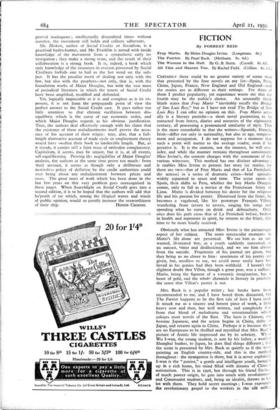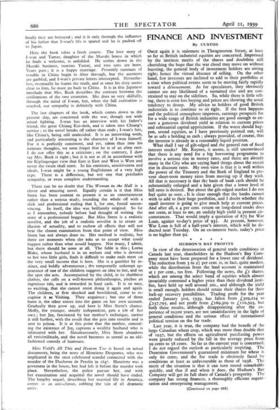FICTION
By FORREST REID
CERTAINLY there could be no greater variety of scene than that presented by the four novels on my list—Spain, Peru, China, Japan, France, New England and Old England—and the stories are as different as their settings. For three of them I predict popularity, yet experience warns me that the fourth may be the public's choice. An unusually frank blurb states that Fray Mario "inevitably recalls the Bridge of San Luis Rey," but as I have not read The Bridge of San Luis Rey I can offer no opinion on this. Fray Mario actu- ally is a literary pastiche—a short novel purporting to be extracted from letters, diaries and memoirs of the eighteenth century, all possessing a pronounced similarity of style. This is the more remarkable in that the writers—Spanish, French, Irish—differ not only in nationality, but also in age, tempera- ment and occupation. I do not suppose for a moment that such a point will matter to the average reader, even if he perceive it. It is the content, not the manner, he will con- sider, and while the manner remains throughout consistently Miss Irvine's, the content changes with the statements of the various witnesses. This method has one distinct advantage ; it enables Miss Irvine to present her story (oi stories, for there are two—that of Fray Mario and that of La Perricholi. the actress) in *a series of dramatic crises—brief episodes widely separated in space and time. The scene opens in Spain, then shifts to Peru, whither the boy Mario Otaeguy comes, only to fail as a novice at the Franciscan friary in Lima. Mario is divided between his desire for the religious life and his passion for poetry. Dismissed from the friary, he becomes a vagabond, like his prototype Francois Villon, wandering from tavern to tavern, singing his songs and spending what he earns on drink and debauchery. Only once does his path cross that of La Perricholi before, broken in health and repentant in spirit, he returns to the friary, this time to be more kindly received.
Obviously what has attracted Miss Irvine is the picturesque aspect of her tubject. The more spectacular moments in Mario's life alone are presented. We see him as an un- wanted, ill-treated boy, as a youth suddenly converted, as an outcast, bitter and disillusioned, and we see him always from the outside. Fragments of his journal are given, but they bring us no closer to him: specimens of his poetry are given, but, needless to say, we could more easily have be- lieved in his genius had they been withheld. I haven't the slightest doubt that Villon, though a great poet, was a ruffian: Mario, being the figment of a romantic imagination, has a heart of gold, and the whole chronicle is literary in precisely the sense that Villon's poetry is not.
Mrs. Buck is a -popular writer ; her books have been recommended to me, and I have heard them discussed, but The Patriot happens to be the first tale of hers I have read. It struck me as a sincere and honest piece of work, a little heavy now and then, but Well written, and completely free from that blend of melodrama and sensationalism which colours most novels of the East. The hero is Chinese, the heroine Japanese, and the action begins in China, shifts to Japan, and returns again to China. Perhaps it is because there are no Europeans to be thrilled and mystified that Mrs. Buck's picture of Asiatic life impressed me by its sobriety. WhL n Wu I-wan, the young student, is sent by his father, a wealthy Shanghai banker, to Japan, he does find things different ; ERA the scene is presented by Mrs. Buck as quietly as if she were painting an English country-side, and this is the method throughout : the strangeness is there, but it is never exploited. -I-wan is the "patriot," a gentle and intelligent youth, brought up tit a rich home, his mind filled with dreams of Chine,e nationalism. This is in 1926, but through his friend En-lan, of much poorer origin, he gets into touch with revolutionary and Communist students, and, being an idealist, throws in T.T.191DR lot with them. They hold secret meetings ; I-wan expounds
the revolutionary gospel to the workers in the silk mills ; finally they are betrayed ; and it is only through the influence of his father that I-wan's life is spared and he is packed off to Japan.
Here the book takes a fresh course. The love story of I-wan and Tamar, daughter of the Muraki house in which he finds a welcome, is unfolded. He settles down in the Muraki business, marries Tamar, and two sons are born. Years pass ; it is a happy marriage. Presently rumours of trouble in China begin to filter through, but the accounts are garbled, and I-wan's private letters intercepted. Neverthe- less, eventually he learns the truth, and at once his duty seems clear to him, he must go back to China. It is in this Japanese interlude that Mrs. Buck describes the contrast between the civilisations of the two countries. She does so very skilfully, through the mind of I-wan, but, when the full realisation is reached, our sympathy is definitely with China.
The last chapters of the book, which comes down to the present day, are concerned with the war, though not with actual fighting. I-wan has an interview with his father's friend, the great Chiang Kai-shek, and is taken into Chiang's service ; so the novel breaks off rather than ends ; I-wan's fate, like China's, being still undecided. It is an interesting work, and particularly interesting is the character of I-wan himself. For it is perfectly consistent, and yet, taken thus into his intimate thoughts, we soon forget that he is of an alien race. I do not offer this as a criticism ; on the contrary, I dare say Mrs. Buck is right ; but it is not at all in accordance with the Kiplingesque view that East is East and West is West and never the twain shall meet. In his emotions, sensitiveness and ideals, I-wan might be a young Englishman of a very high type. There is a difference, but not one that precludes sympathy, or even complete understanding.
There can be no doubt that The Woman in the Hall is a clever and amusing novel. Equally certain is it that Miss Stern has been content to present it as an entertainment rather than a serious study, rounding the whole off with a slick and professional ending that I, for one, found uncon- vincing. In itself, the idea was brilliantly original. So far as I remember, nobody before had thought of writing the story of a professional beggar. But Miss Stem is a realistic novelist, and the job of a realistic novelist is to create an illusion of actuality, and to eschew all effects that will not bear the closest examination from that point of view. Miss Stem has not always done so. Her method is realistic, but there are moments when she asks us to accept what could happen rather than what would happen. Not many, I admit, but there should be none at all. The fable is this ; Lorna Blake, whose husband is in an asylum and who is devoted to her two little girls, finds it difficult to make ends meet on the very small income that is hers. She is a gambler by in- stinct, and boldly adventurous ; the temporarily unkempt ap- pearance of one of the children suggests an idea to her, and on the spot she acts. Accompanied by the child, in its shabbiest clothes, she calls on a well-known philanthropist, pitches an ingenious tale, and is rewarded in hard cash. It is so easy, so exciting, that she cannot resist doing it again and again. The children, at first shocked and bewildered, come to re- cognise it as Visiting. They acquiesce ; but one of them hates it, the other enters into the game on her own account. Gradually they grow up, and here is Miss Stern's chance. Molly, the younger, stoutly independent, gets a job of her own ; but Jay, fascinated by her mother's technique, carries it still further, with the result that she gets into trouble and is sent to prison. It is at this point that the mother, conceal- ing the existence of Jay, captures a wealthy husband who is infatuated with her. Simultaneously, Miss Stern abandons all verisimilitude, and the novel becomes as unreal as an old- fashioned comedy of humours.
Miss Field's All This and Heaven Too is based on actual documents, being the story of Henriette Desportes, who was implicated in the once celebrated scandal connected with the murder of the Duchesse de Praslin in 1847. Henriette was a governess in the house, but had left it before the murder took place. Nevertheless, the police pursue her, and with her examination and acquittal the novel should have ended. The lengthy sequel, describing her married life in America, comes as an anti-climax, robbing the tale of all dramatic unity.











































 Previous page
Previous page